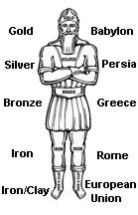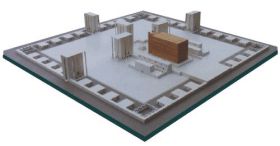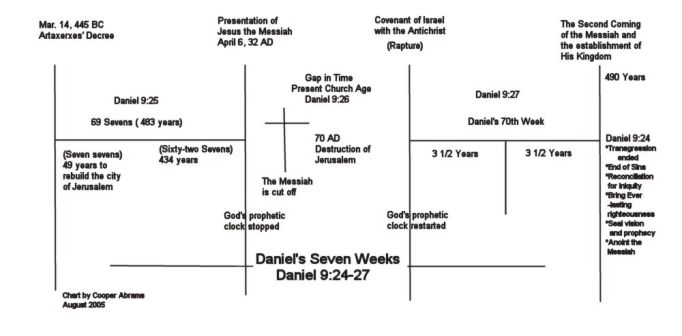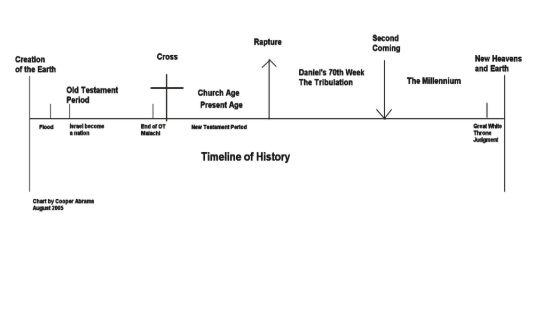The Book of Daniel Chapter Nine
by Cooper P Abrams III
God's Time Table to the Second Coming and the Restoration of Israel
Daniel 9:1-27
In 605 BC Judah, the two southern tribes of the children of Israel were attacked and captured by Nebuchadnezzar king of Babylon. Those not killed in the attack were deported to Babylon as slaves. One hundred and seventeen years earlier the Ten Northern Tribes of Israel had been taken into captivity by the Assyrians in 722 BC. The two Southern Tribes of Judah however were not deported by the Assyrians and remained until Nebuchadnezzar destroyed and deported the Jews in 605 BC. Daniel was among those taken those taken captive and has been in Babylon now many years. Nebuchadnezzar left Jerusalem in ruins and only a small number of Jews remained back in Daniel homeland. Daniel a devout Jew had many questions about Israel's being in Babylon. God had unconditionally promised the land to the Jews, but they were now in Babylon and the temple and the holy city of Jerusalem was in ruins. He had earlier received several visions from God concerning the future world empires, but this was still puzzled him. Jeremiah had predicted that Israel would be in captivity for 70 years and the time period was almost up. The question on Daniel's mind was how would God return Israel to their land and receive the promised blessings of the Lord?

|
This passage begins with Daniel praying aloud to God and confessing his sin and the sins of the children of Israel who were in captivity in Babylon. The time frame of this third vision is toward the end of the Babylon captivity which lasted seventy years. Daniel 9:1 says it occurred in the first year of the reign of Darius the Mede. Chapter 8:1 states that Belshazzar, the Babylon king, had been ruling, but Darius the Mede, with a coalition of the Persians, had overthrown Belshazzar as Daniel 5:1-31 records and the Babylonian Empire was now controlled by the Medo-Persians. |
As Daniel was praying the angel Gabriel touched him and told him that God had sent him to Daniel to explain to him about the earlier vision he had seen.
Daniel 9:1-22
This the third vision God gave to Daniel takes place shortly after Babylon is conquered by the Medo-Persians under the command of Darius the Mede. In this first year of the Medo-Persian rule Daniel has seen the fulfillment of part of God's prophecy concerning the nations that would follow after the Babylonian Empire. God had shown to Nebuchadnezzar a great image of a man. God had revealed that the head of image, which was gold, represented the Babylonian Empire. However, the Babylonian Empire would be succeeded by a second empire which was represented by the silver shoulders and chest the of the image. Daniel had just witnessed the prophecy fulfilled as Babylon had fallen and the silver empire represented in Daniel 7:5 as a bear had come into power.

|
Daniel studied the Book of Jeremiah who had foretold that the period of Israel's exile would be seventy years. Jeremiah 29:10 "For thus saith the LORD, That after seventy years be accomplished at Babylon I will visit you, and perform my good word toward you, in causing you to return to this place." |
Jeremiah also prophesied of in Jeremiah 25:11-12 of the destruction of Babylon:
- "And this whole land shall be a desolation, and an astonishment; and these nations shall serve the king of Babylon seventy years. And it shall come to pass, when seventy years are accomplished, that I will punish the king of Babylon, and that nation, saith the LORD, for their iniquity, and the land of the Chaldeans, and will make it perpetual desolations." Further Jeremiah said that Jerusalem would be rebuilt after they returned to the their land. " Thus saith the LORD; Behold, I will bring again the captivity of Jacob's tents, and have mercy on his dwelling places; and the city shall be builded upon her own heap, and the palace shall remain after the manner thereof. . . . Behold, the days come, saith the LORD, that the city shall be built to the LORD from the tower of Hananeel unto the gate of the corner." (Jeremiah 30:18, 31:38)
Daniel, deeply concerned over the plight of Israel, began to fast and to pray unto God. He fasted, put on sack cloth and covered himself with ashes which was an act of humbling one's self unto the Lord as a preparation for serious prayer. Sackcloth was made of coarse woven black goat's hair and was typically worn by mourners. Ashes were poured on the body as a sign of personal abhorrence to show shame at having failed in some way, thus Daniel is humbling himself before God as he prays. (Dan. 9:3)
Daniel begins praying by confessing the sins of Israel and recognizing God's covenant with them including the promised coming of the Messiah. (Isaiah 53) God had promised Israel great blessings, yet Israel instead had rebelled and rejected God. He acknowledges that God's chosen people had not followed God's instructions which were given to them to secure their well being and receiving the blessing from God. They had rejected God's message as delivered by the prophets to the kings, princes and to all in the nation of Israel. They had rejected God from the highest positions in the nation to the lowest and God had judged them. They were in captivity because of their sins and refusal to accept God's mercy and grace. This is an important point, because God repeatedly had promised His protection and material blessings to them if they would follow righteousness, which simply means to do what was right. But Israel in their pride and love of sin thumped their noses at God's good offer of help and they had suffered greatly for this failure.
In rejecting God they had separated themselves from His protection and they were left to the mercy of their own devices. Turning from God they made themselves to be cursed, because God could not bless them in their disobedience and sin. Even when evil fell on them they would not seek the Lord and His help.
Daniel, as the man of God, like the other prophets prayed earnestly for God to forgive Israel and once again be their God and protector. Daniel had a pastor's heart to plead on behalf of his people to God. He asked that the Lord would restore Jerusalem. He was not begging for forgiveness and restoration based on Israel's repentance or worthiness, but he appealed to God's mercy. He asked that God would reinstate them to the land in that it would show God's greatness and magnify His name among the heathen.
As he is praying, confessing his own sins and that of Israel as night approached the angel Gabriel appeared at his side and touched him. Gabriel tells Daniel that he has come to answer his prayers and give him the understand of Israel's future and further that God greatly favored him.
Daniel 9:24-27
The key to understanding God's purpose in history is in determining God's timing in history. In this case the duration of the seventy weeks mentioned here and is to be understood as not only to Israel's immediate future, but of Israel's place in the fulfillment of God's plan for the promised Messiah and His future Kingdom. This the following verses had great importance in understanding God' future plans as they relate to God's salvation in the Messiah and ultimately for the destiny of Israel and the whole world.
Gabriel tells Daniel that there will be a period of seventy weeks over which God will restore Jerusalem and put an end to Israel's transgressions and sins, make reconciliation for sin and bring everlasting righteousness, to bring about the completion of the prophecy and to anoint the most Holy which refers to the Messiah Jesus the Christ. In other words God's plan will take place over a 70 week period of them (490 years) and Israel would be installed in their land, ruled by the saving Messiah in a state of righteousness. This statement goes much further than just their physical return to the land in Daniel's day, but relates to their becoming the righteous nation God intended. This is referring to the coming one thousand year Millennium when Jesus the Messiah will rule in righteousness and the earth will be restored to a Garden of Eden state. God throughout Israel's history promised them the land and prosperity which has never been fulfilled unto our day. God's promise was that He would give them the land from the Nile River in the south to the Euphrates River in the north, but Israel has never occupied that extent of land. God is saying that in this coming time all God's promises to Israel will be completely fulfilled.
To understand the time period involved we must first we must define the terms. The Hebrew word translated "weeks" (shabuwa` shaw-boo'-ah ) and literally means "a unit of sevens." In English the word "week" means a period of seven days in succession, but this is not true in Hebrew. It by itself is not a reference to a period of time, but rather a unit of seven or a numeral measure. In Hebrew the word doesn't by itself indicate whether it is speaking of days, weeks, months, or years, so it must be interpreted in its context. In other words how the word is used tells you what time period it is referring to. In the case of Daniel 9:24, the number "seventy" modifies the word "weeks" and indicates the time period as being seventy periods of seven, or 490 years. Three times in the Old Testament where the word is used, the word "days" is added to show that "shabuwa" (weeks) by itself was not sufficient to identify the period of time. (see Ezek. 45:21, Dan. 10:2 and 10:3)
In Daniel 9:24, the term "seventy weeks" refers to weeks (unit of seventy) of years or a time span of seventy sevens of years which means 490 years. Daniel was reading the Book of Jeremiah who had said the captivity would last seventy years and now Daniel was at the end of this period and was wondering about the details of the return of Israel to their land. Gabriel appears and informs Daniel that six things would be completed at the end of "seventy weeks."
1. The finish the transgression. The root meaning of the word "transgression" means to rebel. Throughout Israel's history they had rebelled against God and His instructions to them. Zechariah prophesied that Israel would one day turn back to God and receive Jesus as their Messiah (whom they pierced).
"And I will pour upon the house of David, and upon the inhabitants of Jerusalem, the spirit of grace and of supplications: and they shall look upon me whom they have pierced, and they shall mourn for him, as one mourneth for his only son, and shall be in bitterness for him, as one that is in bitterness for his firstborn." (Zechariah 12:10 )
Paul also foretold of God's covenant with Israel, that they would returning permanently to the Lord and be saved having their sins taken away when the "Deliverer," meaning the Messiah, would come out of Zion.
- "For I would not, brethren, that ye should be ignorant of this mystery, lest ye should be wise in your own conceits; that blindness in part is happened to Israel, until the fullness of the Gentiles be come in. And so all Israel shall be saved: as it is written, There shall come out of Sion the Deliverer, and shall turn away ungodliness from Jacob: For this is my covenant unto them, when I shall take away their sins." (Romans 11:25-27 )
2. To make and end to sin. The word "sin" is plural and refers to the multiple sins of Israel's daily life. Gabriel says that God would put an end to these sins and this would be accomplished at Christ's Second Coming or the end of the 490 years.
3. To make reconciliation for iniquity. At Christ's Second Coming Israel will turn to the Lord and the work of the cross, paid for the sins of the world will be applied to them.
4. To bring everlasting righteousness. Israel at the Second Coming will become "right" with God and will no longer be living in unrighteousness. They will never again turn from God and will living in an "everlasting" or eternal state of being right with God.
- "Behold, the days come, saith the LORD, that I will raise unto David a righteous Branch, and a King shall reign and prosper, and shall execute judgment and justice in the earth. In his days Judah shall be saved, and Israel shall dwell safely: and this is his name whereby he shall be called, THE LORD OUR RIGHTEOUSNESS." (Jeremiah 23:5-6)
5. To seal up the vision and prophecy. When Christ returns the visions and prophecies pertaining to Israel's redemption would be finished and completed. Therefore they would be sealed and closed because they had been fulfilled completely. Israel at the time will be saved and will be living in righteousness and there is no further prophecy of their turning from the Lord.
| 6. To anoint the most Holy. One view of the phrase "the most Holy" is that this is a reference to the Millennial temple which will be built at the beginning of kingdom. However, it is the Second Coming of Jesus Christ that is the focus of the end of the seven year Tribulation. The kingdom will be established fifty days after Jesus' Second Coming. The statement of four hundred and ninety years in Daniel 9:24, therefore marks the Second Coming of Jesus Christ, not the building of the Millennial temple.  Moslem Mosque of Omar |
 A representation of the Millennial Temple
(See Ezekiel 41-16)
A representation of the Millennial Temple
(See Ezekiel 41-16)
Concerning the interpretation of the times mentioned Dr. Hoyle Bowman writes:
- "Daniel 7:25 indicates that the Great Tribulation (the last half of the seven-year Tribulation) will last literally "a time, times and half a time , or three and a half years. We know from other references that a "time" equals one year. Revelation 13:5 says that the same period will last forty-two months:
"And there was given unto him a mouth speaking great things and blasphemies; and power was given unto him to continue forty and two months" (Revelation 13:5). Revelation 12:6 says that period will last 1,260 days:
"And the woman fled into the wilderness, where she hath a place prepared of God, that they should feed her there a thousand two hundred and threescore days" (Revelation 12:6).
A comparison of the three time frames indicates usage of months with thirty days: three-and-a-half years equals forty-two thirty-day months, just as 1,260 equals forty-two thirty-day months. The Bible from Genesis to Revelation indicates usage of thirty-day months. Thus the time period indicated in Daniel 9:24 is a period of 490 years (seventy weeks of years) of 360 days each."
Daniel 9:25
Daniel 9:25 says, "The time unto the Messiah, the Prince, shall be seven weeks, and threescore and two weeks; the street shall be built again, and the wall, even in troublous times."
Gabriel says that sixty-nine weeks would lead to the coming of the Messiah the Prince. Verse 27 indicates that the seventieth week is separated from the other sixty nine so only 483 years of the total 490 involved in Daniel's prophecy span the time between the command concerning Jerusalem and the coming of the Messiah. The prophecy of the 483 years has been fulfilled as Christ came and was "cut off", but He has not returned in His Second Coming. This means that God's prophetic clock stopped at the end of the 483 years and is presently on hold in this gap in the time frame of the prophecy. Currently we are end the dispensation of the Church Age when God is not working directly with Israel prophetically, but is gathering to Himself souls from among the Gentiles. God's prophetic clock will begin again when the 484th year begins with the rapture and the beginning of Daniel's 70th week which is the Tribulation.
Daniel is told that the Messiah's first coming would be in 434 years ( Sixty two weeks) [verse 26] and His second coming and setting up of His kingdom would be in 490 years completing the prophecy.
Gabriel in Daniel 9:25 states that starting day of this 490 years would be the issuance of a decree to restore and rebuild Jerusalem. However, the Medo-Persians rulers issued several such decree and therefore to determine the starting point it must be established which decree was the one Gabriel was referring.
Isaiah prophesied that a ruler named Cyrus would issue a decree to allow the walls of Jerusalem and the foundations of the temple to be rebuilt. Isaiah prophesied to the Northern kingdom of Israel (10 tribes) and at that time Jerusalem and the temple stood. Thus the prophet named the name of this king 160 years before the event. Cyrus is called God's shepherd and also His anointed because of his benevolence to Israel.
-
"That saith of Cyrus, He is my shepherd, and shall perform all my pleasure: even saying to Jerusalem, Thou shalt be built; and to the temple, Thy foundation shall be laid." (Isaiah 44:28)
- "Thus saith the LORD to his anointed, to Cyrus, whose right hand I have holden, to subdue nations before him; and I will loose the loins of kings, to open before him the two leaved gates; and the gates shall not be shut; I will go before thee, and make the crooked places straight: I will break in pieces the gates of brass, and cut in sunder the bars of iron: And I will give thee the treasures of darkness, and hidden riches of secret places, that thou mayest know that I, the LORD, which call thee by thy name, am the God of Israel. For Jacob my servant's sake, and Israel mine elect, I have even called thee by thy name: I have surnamed thee, though thou hast not known me." (Isaiah 45:1-4 )
Cyrus issued the first decree in 538 or 537 BC. The second decree was given by Darius in 519 BC and the third by Artaxerxes in 458 BC and the last by Artaxerxes in 445 BC. The question is which decree is the starting point of the 490 years.
Daniel 9:25 mentions that the street and the walls were to be rebuilt. The street refers to the inward part of the city and walls the outward protection and both would be necessary to complete the rebuilding of the city. The Hebrew word that is translated "walls" literally means a trench and seems to refer to not only the walls but a moat which was always dug in front of the walls for added protection.
The first to return to Israel and attempt to rebuild the walls of the city was Ezra and he records the fulfillment of Jeremiah's prophecy, but it does not fit Gabriel's proclamation.
"Now in the first year of Cyrus king of Persia, that the word of the LORD by the mouth of Jeremiah might be fulfilled, the LORD stirred up the spirit of Cyrus king of Persia, that he made a proclamation throughout all his kingdom, and put it also in writing, saying, Thus saith Cyrus king of Persia, The LORD God of heaven hath given me all the kingdoms of the earth; and he hath charged me to build him an house at Jerusalem, which is in Judah. Who is there among you of all his people? his God be with him, and let him go up to Jerusalem, which is in Judah, and build the house of the LORD God of Israel, (he is the God,) which is in Jerusalem. And whosoever remaineth in any place where he sojourneth, let the men of his place help him with silver, and with gold, and with goods, and with beasts, beside the freewill offering for the house of God that is in Jerusalem." (Ezra 1:1-4 )
Although Ezra returned to Israel and attempted to rebuild the city because the local residents, who were the enemies of Israel, sent word to Artaxerxes saying if the Jews completed their work they would rebel against him.(Ezra 4:8-16) Artaxerxes stopped the work. Later Artaxerxes issues a decree to Nehemiah in 445 BC which allowed him to rebuild the city and the walls. The three earlier decrees by Cyrus, Darius and Artaxerxes' first decree did not authorized the rebuilding of the walls. Under Babylonian law a king could not reverse a decree once it was made official. Apparently Artaxerxes' first decree or the earlier decrees of Cyrus and Darius did not include rebuilding the walls, because this would amount to the king reversing a decree. This means that the fourth decree of Artaxerxes in March of 445 BC is the starting point of the 490 years.(See Nehemiah 2:1-8)
It took the Jews forty nine years to rebuild Jerusalem and its walls because of the opposition of Israel's enemies. Gabriel states that the rebuilding of Jerusalem would be in "troublous times." History records that the prophecy of Daniel 9:24-25 was accurately fulfilled until the four hundred and eighty third year. What has not been fulfilled is the last week which would end the four hundred and sixty year prophecy.

Chart - Seventy Weeks of Daniel

Chart - Timeline of History